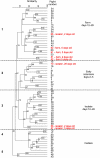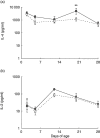Rearing environment affects development of the immune system in neonates
- PMID: 20184618
- PMCID: PMC2883114
- DOI: 10.1111/j.1365-2249.2010.04090.x
Rearing environment affects development of the immune system in neonates
Abstract
Early-life exposure to appropriate microbial flora drives expansion and development of an efficient immune system. Aberrant development results in increased likelihood of allergic disease or increased susceptibility to infection. Thus, factors affecting microbial colonization may also affect the direction of immune responses in later life. There is a need for a manipulable animal model of environmental influences on the development of microbiota and the immune system during early life. We assessed the effects of rearing under low- (farm, sow) and high-hygiene (isolator, milk formula) conditions on intestinal microbiota and immune development in neonatal piglets, because they can be removed from the mother in the first 24 h for rearing under controlled conditions and, due to placental structure, neither antibody nor antigen is transferred in utero. Microbiota in both groups was similar between 2 and 5 days. However, by 12-28 days, piglets reared on the mother had more diverse flora than siblings reared in isolators. Dendritic cells accumulated in the intestinal mucosa in both groups, but more rapidly in isolator piglets. Importantly, the minority of 2-5-day-old farm piglets whose microbiota resembled that of an older (12-28-day-old) pig also accumulated dendritic cells earlier than the other farm-reared piglets. Consistent with dendritic cell control of T cell function, the effects on T cells occurred at later time-points, and mucosal T cells from high-hygiene, isolator pigs made less interleukin (IL)-4 while systemic T cells made more IL-2. Neonatal piglets may be a valuable model for studies of the effects of interaction between microbiota and immune development on allergy.
Figures





References
-
- Bjorksten B, Sepp E, Julge K, Voor T, Mikelsaar M. Allergy development and the intestinal microflora during the first year of life. J Allergy Clin Immunol. 2001;108:516–20. - PubMed
-
- Rautava S, Kalliomaki M, Isolauri E. Probiotics during pregnancy and breast-feeding might confer immunomodulatory protection against atopic disease in the infant. J Allergy Clin Immunol. 2002;109:119–21. - PubMed
-
- Smits HH, Engering A, van der Kleij D, et al. Selective probiotic bacteria induce IL-10-producing regulatory T cells in vitro by modulating dendritic cell function through dendritic cell-specific intercellular adhesion molecule 3-grabbing nonintegrin. J Allergy Clin Immunol. 2005;115:1260–7. - PubMed
-
- Sudo N, Yu XN, Aiba Y, et al. An oral introduction of intestinal bacteria prevents the development of a long-term Th2-skewed immunological memory induced by neonatal antibiotic treatment in mice. Clin Exp Allergy. 2002;32:1112–16. - PubMed
-
- van Odijk J, Kull I, Borres MP, et al. Breastfeeding and allergic disease: a multidisciplinary review of the literature (1966–2001) on the mode of early feeding in infancy and its impact on later atopic manifestations. Allergy. 2003;58:833–43. - PubMed
Publication types
MeSH terms
Substances
LinkOut - more resources
Full Text Sources

